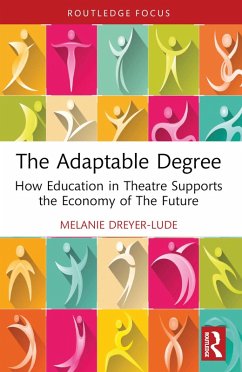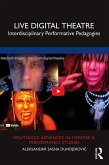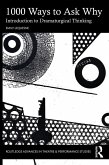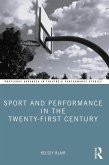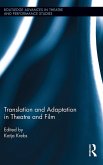Melanie Dreyer-Lude
The Adaptable Degree (eBook, PDF)
How Education in Theatre Supports the Economy of The Future
20,95 €
20,95 €
inkl. MwSt.
Sofort per Download lieferbar

10 °P sammeln
20,95 €
Als Download kaufen

20,95 €
inkl. MwSt.
Sofort per Download lieferbar

10 °P sammeln
Jetzt verschenken
Alle Infos zum eBook verschenken
20,95 €
inkl. MwSt.
Sofort per Download lieferbar
Alle Infos zum eBook verschenken

10 °P sammeln
Melanie Dreyer-Lude
The Adaptable Degree (eBook, PDF)
How Education in Theatre Supports the Economy of The Future
- Format: PDF
- Merkliste
- Auf die Merkliste
- Bewerten Bewerten
- Teilen
- Produkt teilen
- Produkterinnerung
- Produkterinnerung

Bitte loggen Sie sich zunächst in Ihr Kundenkonto ein oder registrieren Sie sich bei
bücher.de, um das eBook-Abo tolino select nutzen zu können.
Hier können Sie sich einloggen
Hier können Sie sich einloggen
Sie sind bereits eingeloggt. Klicken Sie auf 2. tolino select Abo, um fortzufahren.

Bitte loggen Sie sich zunächst in Ihr Kundenkonto ein oder registrieren Sie sich bei bücher.de, um das eBook-Abo tolino select nutzen zu können.
This book uses a mixed methods research study of the career experiences of theatre graduates in the U.S. to provide data on employment patterns and job satisfaction.
- Geräte: PC
- mit Kopierschutz
- eBook Hilfe
Andere Kunden interessierten sich auch für
![The Adaptable Degree (eBook, ePUB) The Adaptable Degree (eBook, ePUB)]() Melanie Dreyer-LudeThe Adaptable Degree (eBook, ePUB)20,95 €
Melanie Dreyer-LudeThe Adaptable Degree (eBook, ePUB)20,95 €![Critical Acting Pedagogy (eBook, PDF) Critical Acting Pedagogy (eBook, PDF)]() Critical Acting Pedagogy (eBook, PDF)35,95 €
Critical Acting Pedagogy (eBook, PDF)35,95 €![Live Digital Theatre (eBook, PDF) Live Digital Theatre (eBook, PDF)]() Aleksandar Sasha DundjerovicLive Digital Theatre (eBook, PDF)40,95 €
Aleksandar Sasha DundjerovicLive Digital Theatre (eBook, PDF)40,95 €![1000 Ways to Ask Why (eBook, PDF) 1000 Ways to Ask Why (eBook, PDF)]() Emily Lequesne1000 Ways to Ask Why (eBook, PDF)38,95 €
Emily Lequesne1000 Ways to Ask Why (eBook, PDF)38,95 €![Sport and Performance in the Twenty-First Century (eBook, PDF) Sport and Performance in the Twenty-First Century (eBook, PDF)]() Kelsey BlairSport and Performance in the Twenty-First Century (eBook, PDF)38,95 €
Kelsey BlairSport and Performance in the Twenty-First Century (eBook, PDF)38,95 €![Translation and Adaptation in Theatre and Film (eBook, PDF) Translation and Adaptation in Theatre and Film (eBook, PDF)]() Translation and Adaptation in Theatre and Film (eBook, PDF)41,95 €
Translation and Adaptation in Theatre and Film (eBook, PDF)41,95 €![The Literary Manager's Toolkit (eBook, PDF) The Literary Manager's Toolkit (eBook, PDF)]() Sue HealyThe Literary Manager's Toolkit (eBook, PDF)33,95 €
Sue HealyThe Literary Manager's Toolkit (eBook, PDF)33,95 €-
-
-
This book uses a mixed methods research study of the career experiences of theatre graduates in the U.S. to provide data on employment patterns and job satisfaction.
Dieser Download kann aus rechtlichen Gründen nur mit Rechnungsadresse in A, B, BG, CY, CZ, D, DK, EW, E, FIN, F, GR, HR, H, IRL, I, LT, L, LR, M, NL, PL, P, R, S, SLO, SK ausgeliefert werden.
Produktdetails
- Produktdetails
- Verlag: Taylor & Francis eBooks
- Seitenzahl: 112
- Erscheinungstermin: 20. September 2024
- Englisch
- ISBN-13: 9781040216705
- Artikelnr.: 72283576
- Verlag: Taylor & Francis eBooks
- Seitenzahl: 112
- Erscheinungstermin: 20. September 2024
- Englisch
- ISBN-13: 9781040216705
- Artikelnr.: 72283576
- Herstellerkennzeichnung Die Herstellerinformationen sind derzeit nicht verfügbar.
Melanie Dreyer-Lude is an American theatre artist/scholar specializing in international theatre collaboration and multidisciplinary projects. She is a professor in the Department of Drama at the University of Alberta and lives and works in Edmonton, Alberta, Canada.
Acknowledgements
Introduction
Chapter 1: Passion versus practicality
Do I need a college degree?
The reality of being an arts grad
What employers want
Passion can lead to prosperity
What the survey told us
In summary
Chapter 2: Patterns of employment
Four employment scenarios
The trajectory of a career in the arts
Seeking employment in a shifting job market
Where are arts grads working?
The Creative Trident redefined
What the survey told us
In summary
Chapter 3: Skills for all professions
A graduate who shifted careers
The predominance of shifting careers
The importance of transferable skills
How theatre training delivers
What theatre training looks like
What the survey told us
In summary
Chapter 4: Value versus expense
The loss of public faith
The student as a customer
Earning potential as a decision-maker
The cost of an education
The neoliberal paradigm
The challenge of performance indicators
The reality of program cuts
Politicians and the academy
What the survey told us
In summary
Chapter 5: Changing the message
The academy must adapt
The challenges we face
What an arts degree already offers
Expanding our curriculum
How other sectors benefit from arts education
The threat to theatre departments
Our training focus must shift
Recommendations for change
What the graduates in this study told us
In summary
Methodology
Introduction
Research framework
Research design
Sampling strategy
Data collection
Data analysis
Limitations and assumptions
Recommendations for future research
Jobs listed by survey participants
Index
Introduction
Chapter 1: Passion versus practicality
Do I need a college degree?
The reality of being an arts grad
What employers want
Passion can lead to prosperity
What the survey told us
In summary
Chapter 2: Patterns of employment
Four employment scenarios
The trajectory of a career in the arts
Seeking employment in a shifting job market
Where are arts grads working?
The Creative Trident redefined
What the survey told us
In summary
Chapter 3: Skills for all professions
A graduate who shifted careers
The predominance of shifting careers
The importance of transferable skills
How theatre training delivers
What theatre training looks like
What the survey told us
In summary
Chapter 4: Value versus expense
The loss of public faith
The student as a customer
Earning potential as a decision-maker
The cost of an education
The neoliberal paradigm
The challenge of performance indicators
The reality of program cuts
Politicians and the academy
What the survey told us
In summary
Chapter 5: Changing the message
The academy must adapt
The challenges we face
What an arts degree already offers
Expanding our curriculum
How other sectors benefit from arts education
The threat to theatre departments
Our training focus must shift
Recommendations for change
What the graduates in this study told us
In summary
Methodology
Introduction
Research framework
Research design
Sampling strategy
Data collection
Data analysis
Limitations and assumptions
Recommendations for future research
Jobs listed by survey participants
Index
Acknowledgements
Introduction
Chapter 1: Passion versus practicality
Do I need a college degree?
The reality of being an arts grad
What employers want
Passion can lead to prosperity
What the survey told us
In summary
Chapter 2: Patterns of employment
Four employment scenarios
The trajectory of a career in the arts
Seeking employment in a shifting job market
Where are arts grads working?
The Creative Trident redefined
What the survey told us
In summary
Chapter 3: Skills for all professions
A graduate who shifted careers
The predominance of shifting careers
The importance of transferable skills
How theatre training delivers
What theatre training looks like
What the survey told us
In summary
Chapter 4: Value versus expense
The loss of public faith
The student as a customer
Earning potential as a decision-maker
The cost of an education
The neoliberal paradigm
The challenge of performance indicators
The reality of program cuts
Politicians and the academy
What the survey told us
In summary
Chapter 5: Changing the message
The academy must adapt
The challenges we face
What an arts degree already offers
Expanding our curriculum
How other sectors benefit from arts education
The threat to theatre departments
Our training focus must shift
Recommendations for change
What the graduates in this study told us
In summary
Methodology
Introduction
Research framework
Research design
Sampling strategy
Data collection
Data analysis
Limitations and assumptions
Recommendations for future research
Jobs listed by survey participants
Index
Introduction
Chapter 1: Passion versus practicality
Do I need a college degree?
The reality of being an arts grad
What employers want
Passion can lead to prosperity
What the survey told us
In summary
Chapter 2: Patterns of employment
Four employment scenarios
The trajectory of a career in the arts
Seeking employment in a shifting job market
Where are arts grads working?
The Creative Trident redefined
What the survey told us
In summary
Chapter 3: Skills for all professions
A graduate who shifted careers
The predominance of shifting careers
The importance of transferable skills
How theatre training delivers
What theatre training looks like
What the survey told us
In summary
Chapter 4: Value versus expense
The loss of public faith
The student as a customer
Earning potential as a decision-maker
The cost of an education
The neoliberal paradigm
The challenge of performance indicators
The reality of program cuts
Politicians and the academy
What the survey told us
In summary
Chapter 5: Changing the message
The academy must adapt
The challenges we face
What an arts degree already offers
Expanding our curriculum
How other sectors benefit from arts education
The threat to theatre departments
Our training focus must shift
Recommendations for change
What the graduates in this study told us
In summary
Methodology
Introduction
Research framework
Research design
Sampling strategy
Data collection
Data analysis
Limitations and assumptions
Recommendations for future research
Jobs listed by survey participants
Index
